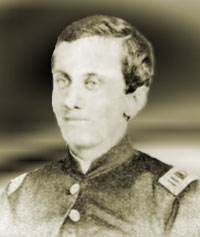 | | Samuel T. Cushing |
|
On the 29th of August, 1861, Lieut. Samuel T. Cushing was ordered to "put the signal party in Camp of Instruction at Red Hill, Georgetown, to-morrow. The camp will be formed under your direction, and the officers and men will, with the exception
of Capt. Ent, be in my absence, under your control. You will make the necessary requisitions for supplies as 'in charge of signal party'. Such articles as are for issue to officers, as horses and saddles, I will receipt for". This order came from Maj. Myer, who remained with Gen. McClellan at the headquarters of the newly-formed Army of the Potomac.
|
Hdqrs. Signal Camp of Instuction,
General Orders No. 1.
Aug. 31, 1861
- This camp will be known as the Signal Camp of Instruction, near Georgetown, D.C.
- All officers and soldiers attached to this detachment will be required to remain in camp unless authorized specially to be absent. No passes will be granted except in the most urgent cases, and not more than four officers will be allowed to be absent at a time, nor more than five privates. All passes will be granted by the Signal Major, or, in his absence
by Lieut. Cushing, Assistant Signal Officer, on recommendation of Capt. Ent, 6th Pennsylvania Reserve Corps.
- The non-commissioned officers and privates of this command will be under the charge of Sergt. McVay, Co. D., 2d Infantry. He will be obeted and respected accordingly.
- Until further orders, the following hours are announced for the different roll-calls;-
| Reveille, daybreak. | Dinner, 12.30 P. M. |
| Police of Camp | Flag practice, 1 to 2 |
| Flag practice 6 to 7 A.M. | Flag practice 3 to 4 |
| Breakfast, 7.30 | Retreat (Inspection) Sunset |
| Flag practice, 9 to 10 | Tatto, 9 P.M. |
| Manual Drill, 10 to 11 | Taps, 9.20. |
Such further drills as may be necessary will be announced from time to time, as occasion may demand.
- Until further orders a guard of six men and two non-commissioned officers will be detailed for the party, mounting at retreat.
- An inspection of arms and tents will take place at retreat, when every soldier will be expected to have his arms and accoutrements on perfect order. The tents of the commissioned officers will be inspected at the same time.
- It is particularly enjoined upon all officers and soldiers to devote as much time as possible to the study of thier different duties, in order that the party may be prepared immediately for service.
- Attention to minute details argues a good state of discipline. In future all soldiers must salute all officers, and in all cases the proper distinction must be observed between officers and men.
- Corp. George McGown, Co. C., 2d Infantry, is hereby appointed Quartermaster-Sergeant of this party.
By order of Maj. Myer,
Samuel T. Cushing,
Assistant S.O. in Charge
|
The order under which the details for signal service were made prescribed that the officers should be "intelligent men of good education, possessing good eyesight, and persons in whom the regimental commanders have especial confidence, the privates
to be selected on account of their intelligence, and to be able to read and write."
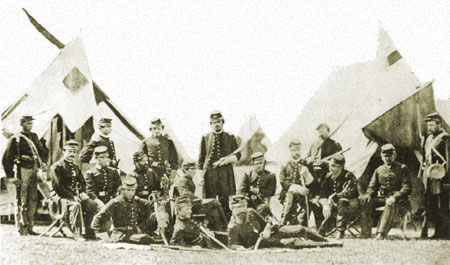 |
| Signal Camp ~ Georgetown, D.C., 1861 |
The organization of the Signal Corps of the Army of the Potomac was begun at once. The officers and men detailed from the Pennsylvania Reserves, two lieutenants and four privates from each regiment, reported at Tenallytown, Md., just north of Georgetown, D.C., at the headquarters
of Gen McCall, commanding the Pennsylvania Reserve Corp. They immediately went into camp by themselves near the top of the hill at that place, on the east side of the main road, close by a building, afterwards known as Fort Reno.
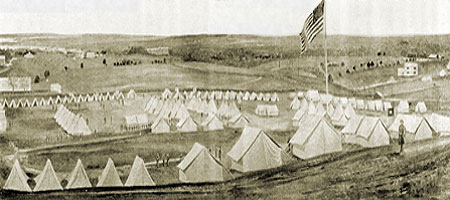 |
| Signal Camp ~ Georgetown, D.C., May 1864 |
Similar details were made from the divisions of Gen. Charles P. Stone and Gen. N.P. Banks. These officers and men were brought together in small camps at Poolesville, Md., the headquarters of Gen. Stone; on the top of Sugar Loaf Mountian; and at Darnestown, Md., the headquarters of Gen. Banks.
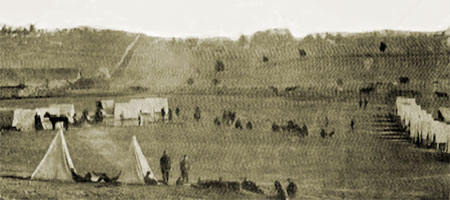 |
| Signal Camp ~ Red Hill, Georgetown, D.C., 1861 |
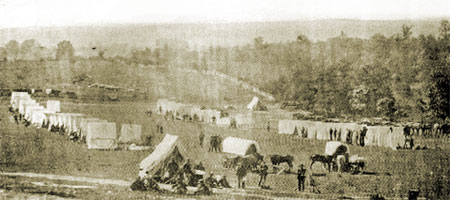 |
| Signal Camp ~ Red Hill, Georgetown, D.C., 1861 |
These camps were respectively in the charge of Lieuts. Theodore S. Dunmont, 5th N.Y. Vols., Evan Thomas, 4th Artillery, and Leonard F. Hepburn, 4th N.Y. Vols., who had been instructed by Maj. Myer at Fort Monroe. The course of instruction in signal duty at these camps mentioned was commenced at once and procecuted with vigor. Daily communications was maintained by flag and torch between the camps.
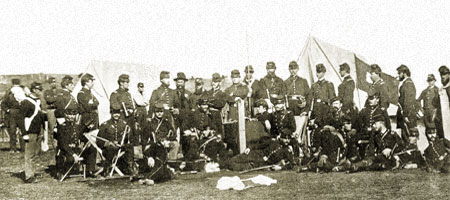 |
| Signal Camp ~ Georgetown, D.C., 1861 ~ Myer's 'OLD GUARD' |
The following are the reminiscences of Major O.H. Howard, of this early life of the Corps, taken from "The Signal Corps in the War of the Rebellion, by J. Willard Brown":
 | | Ocran H. Howard |
|
"In August I was ordered
to report at the Signal Camp of Instruction at Darnestown for examination as to my fitness for signal duty. Lieut. Thomas R. Robeson of my regiment, the 2d Mass., received similar orders, and together we proceeded to Darnestown and reported to Leonard F. Hepburn, acting signal officer in charge. I have no definite rememberance of the nature of our examination, but it will suffice to say that we passed the ordeal and were accepted.
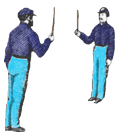 | | Wand Signal Pratice |
|
We remained at Darnestown a short time engaged in acquiring a knowledge of our new duties, memorizing the signal code, and practicing with 'WANDS', as certain pine sticks were designated. We found in camp other officers recently detailed from the army of Gen. Banks, who had
succeeded Gen. Patterson, and still others joined later on. I cannot, I am sorry to say, recall all their names, after the lapse of a quarter of a century, but there were besides Lieut. Hepburn, Lieutenants W.S. Stryker, F.R. Shattuck, E.I. Meeker, N. Daniels, E.E. Burr, J.H. Spencer, W.L. Larned, J.H. Fralich, F.N. Wicker, S.D. Byram, B.N. Minor, W.W. Rowley, and I.J. Harvey.
Maj. Myer soon joined us, and, as we were to be mounted, a requisition was made for horses. This requisition, duly signed signed and approved, was entrusted to me with instructions to present it ti the chief quartermaster, get the horses, and bring them to camp. I remember that upon presenting the requisition to the quartermaster he scarcely deigned to notice me, kept me waiting about his office tent from sometime before noon until nearly sunset before he attended to my business,
and then contrived to do it in a manner that impressed me with the feeling that the horses were his private property, and that he had reluctantly decided to give them to me with a string tied to them for the purpose of recovering them should he have subsequent occasion to regret his munificence. Leaving his camp after dark with the horses in charge, I was not surprised, after riding some miles toward our camp, to be overtaken by a messenger ib civilian garb, with a verbal command from the quartermaster to bring the horses back. I did not do it. I have never learned why I was not cashiered for my temerity on that occasion."
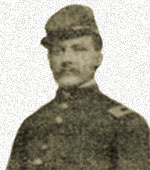 | | Leonard F. Hepburn |
|
August 31st Lieut. Hepburn reported that his station was at Darnestown, at a point commanding a fine view of the mountian. Twenty-four officers and forty-eight men had reported to him on the 26th. Ten of these officers he had sent to Lieut. Thomas at Sugar Loaf Mountian, the rest remaining at his camp to be instructed by him.
After these three stations were opened, Maj. Myer sent the following communication to Lieutenants Hepburn, Thomas, and Dumont:~
"I cannot to strongly impress upon you the neccessity of immediate and through instruction of the officers and men of your party. At least five hours in each day must be given to their instruction. This I wish to be almost entiely practiced with small articles held in the hand, and the signals to be made with the greatest rapidity. Practice most thoroughly all officers in repeating signals; that is, there being three officers, the first makes a message which is repeated signal by signal as fast as made by the second, and is read by the third officer, who is not to see the signals made by the first. It is to be answered in like manner."
 | | Evan Thomas |
|
Meanwhile the officers of the confederate Signal Corps were assiduously prosecuting their studies and practicing day and night on the Virginia side of the Potomac. From the station on Sugar Loaf Mountain the lights of a confederate signal station were discovered August 28th, and were frequently visable thereafter. Lieut. Thomas was compelled to report his inability to dicipher the messages transmitted.
"Early in September," continues Maj. Howard, "our camp at Darnestown was broken up, and, bestriding army saddles for the first time, we were conducted by Maj. Myer to the Signal Camp of Instruction at Georgetown, D.C.
"Do you remember the feeling of vacuum beneath and 'between' you, after dismounting from your first long day's work in the saddle? Do you remember what strangers to each other your feet and knees were for a few days thereafter? I have since ridden thousands of miles in army saddles, but I can, to-day, recall the feeling of 'twoness' which I experienced as I rolled out of my saddle in front of the long line of tents at Georgetown, upon our arrival there after that long ride.
"Equally vivid is my remembrance of the boundless hospitality of the officers, all strangers to us, whom we found there. Their tents were ours - none had yet been pitched for us - their mess was ours, their bunks were ours. One of them slept on the ground that night and I slept in his bunk. I had no choice in the matter."
INSTRUCTION AT WEST POINT
In 1863 Capt. Samuel T. Cushing was ordered to West Point to give instruction in signalling. The results which followed from his instruction must have been more gratifying to Maj. Myer than to the commandant. He says: "From Washington I went to the Military Academy at West Point to introduce the system as part of the course of instruction. I reached there in July, 1863, and was kept on duty until February, 1864, when I was relieved from signal duty and commenced my duty as Commissary of Subsistence. The Signal Course was a popular one at the Academy. The first class was instructed fully and learned to be good signalists. The officers charged with the
disipline of the Academy said that I had 'ruined the service,' since by several methods not known to officers, all the cadets could, by winking their eyes, wiping their lips, tapping on gas pipes, etc., etc., communicate information as to inspections going on, and give intelligence in section rooms as to abstruse questions, etc., etc., and consequently the cadet could engage in all sorts of rascality with less fear of detection than ever before. I thought it quite a compliment to the usefulness of the code."
Also See: Signal Officer Course
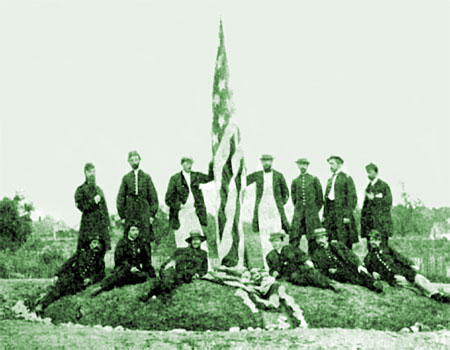 |
| Striking the Flag at Camp ~ August, 1865 |
